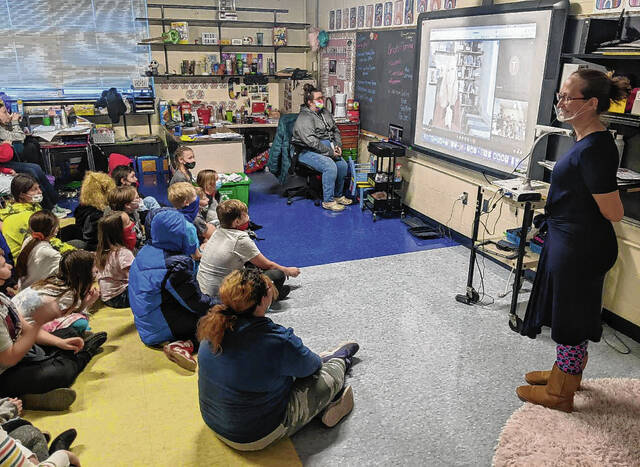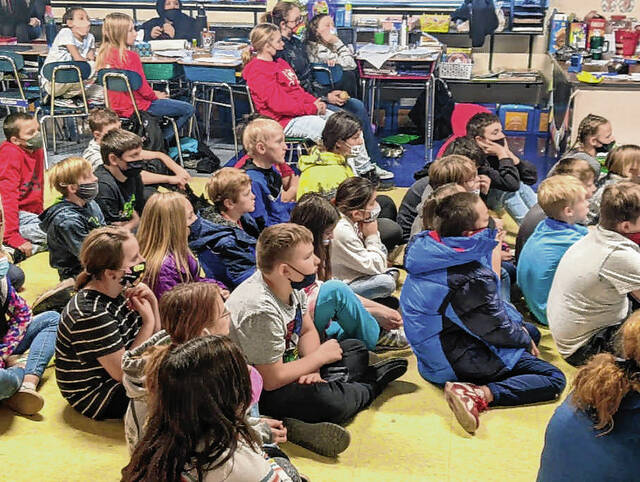CROTHERSVILLE — Schoolchildren are using technology more these days to do their work in the classroom and at home.
They aren’t putting a book in their hands to read or putting a pen or pencil to paper to write as much as they used to.
With those ideas in mind, Crothersville Elementary School fourth grade teacher Tiffany Orrill came up with ways to encourage kids to read and write as often as possible.
Her students don’t read books and then take Accelerated Reader tests anymore, so she said she wanted to make them accountable somehow and created a fun way to let them choose the books they want to read.
The 40-book challenge involves Orrill’s students reading at least that many books over the school year, and she wants them to choose books that are outside their comfort zone.
On Friday, they did something that involved learning about reading and writing that also was outside their comfort zone.
She arranged a Zoom call with author Ellen Potter and invited the other fourth grade class and the fifth grade class to join. That gave the students a chance to interact with Potter, pick up tips about writing and reading and ask questions.
On her website, Potter said she was 11 when she realized she wanted to be a writer. Her school librarian recommended she read the book “Harriet the Spy,” and while reading the first chapter, she said she decided the best books in the world were written for 11-year-olds. She then wanted to grow up and write books for kids.
After many years and piles of rejection letters, she said she has written more than 20 award-winning novels for children and young adults.
So how does she get ideas for her books? They come from all over the place, she told the Crothersville students.
“The cool thing about being a writer is it’s sort of like it’s two jobs,” she said. “One of your jobs is to write stories to write books, but your other job is to pay attention. It’s almost like you’re a detective in the world. You’re always listening. You’re always watching.”
Story ideas can come from things that really happened to you or other people, in your dreams, overheard in a conversation, from reading other stories or from television or movies, she said.
“We just want to be careful that you’re inspired but you’re not copying,” she said.
Borrowing it and using it for one of your own characters or setting is OK, she said.
“You just want to be sure that your own imagination and your own sense of humor and your own way of looking at the world is coming through,” Potter said. “That’s what people want to read. They don’t want to read a copy of another story. They want to read something that’s coming right from you.”
Potter said she thinks of her story ideas as story seeds. Just like you plant seeds, water them and give them sunshine, she said you have to tend to them to see what they grow into.
The way she grows her “story seeds” is asking a lot of “What if” questions.
“When you get a story idea, try thinking about those ‘What if’ questions and let your imagination go totally crazy,” Potter said. “What probably will happen is you’ll start generating more and more story ideas and be so excited about the story you’re going to be like, ‘Get out of my way. I want to write this story.’”
Potter also shared her top three writing tips, which she said are really easy things that the students likely already are doing.
The first is to read a lot.
“Writers are big readers. Every professional writer I know generally devours books,” Potter said. “It teaches us how to become better writers. Your best writing teachers are actually books, and they could be any book at all. … When you read, it’s like you’re absorbing all of this information about how to write, and you are absorbing information about how to create great characters or how to create suspense or how to create a terrifying scene.”
The second tip is to write a little bit every day.
“When you’re writing a story, you’re actually doing something kind of magical,” Potter said. “If you think about it, what you’re doing when you write a story is you are creating a world out of thin air. You’re creating a world out of absolutely nothing. You’re creating characters out of thin air. It is the most fun thing to do, but it’s also really tricky, so the way to do it to keep it fun and to keep the flow and momentum going in your story is to write every single day.”
As you write, Potter said you’re knocking on the door of a world you created, waiting for the characters to let you in and then connecting to them.
“When you write every single day, you are bringing that world to life,” she said. “Your world that you’re writing is going to start feeling really real to you, and if it feels real to you, guess what? It’s going to feel real to your readers, as well.”
The final tip is to do revisions. After writing the first draft, she said you’re not really done. You need to go back and reread it, and you will find things to make a little bit better.
“I usually revise my books 20 to 30 times before I give them to my editor, who then asks me for more revisions,” she said. “There’s a lot of revising that goes into writing books or stories. I actually spend more time revising my books than actually writing out the first draft. Then I end up with a story I really, really love.”
During the question-and-answer portion of the Zoom meeting, one of the fourth-graders asking Potter a question was Owen Ingham.
He said he had read Potter’s book “Big Foot and Little Foot.”
“I saw the book in the library, so I’m like, ‘Mom, Mom, can I get this book?’” he said. “I started reading it, and I liked it was about a kid Bigfoot meeting a human and then they became best friends and did stuff together.”
When he asked Potter about her favorite book, she said it’s not her favorite, but it’s the most popular one she has written. Ingham was pleasantly surprised to learn the main character’s first name is the same as his.
“That’s why I want to read it now,” he said of Potter’s book “Slob.”
Having an opportunity to interact with an author was an experience Ingham will remember.
“It was my first time, so I was pretty excited,” he said. “We got to ask questions about the books and stuff, and she told us about the book, which made me want to read.”




